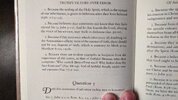mpb
Puritan Board Freshman
What most people see of Washer is what happens to be the most viewed stuff of his that circulates on YouTube and Facebook, and it’s often him at these big conferences preaching to wake up a sleeping church in the West that has lost the sight of the need for personal godliness. Those kind of talks are needed, and Washer is about the best the church has been blessed with in the last few decades to do so.
But of course, if that’s all you hear from him, you’re going to think he’s unbalanced, and if you constantly listen to that and nothing else, then it could be hard on the soul.
In a recent talk he gave (I believe the one for the PRTS graduation this year) he spoke about how at his church, his pastor had asked him to preach each Wednesday night. So he’s been doing a series on the immense love of Christ to His people. Washer noted how it’s way different than what people are used to him talking about, or what they expect from him. But he said those clips that get the most views are not what he focuses on most, and once someone is converted he just wants them to know and rest in Christ’s deep love for them. He said how some visitors came and listened to one of these talks and thought Washer had gone “soft.”
But of course, if that’s all you hear from him, you’re going to think he’s unbalanced, and if you constantly listen to that and nothing else, then it could be hard on the soul.
In a recent talk he gave (I believe the one for the PRTS graduation this year) he spoke about how at his church, his pastor had asked him to preach each Wednesday night. So he’s been doing a series on the immense love of Christ to His people. Washer noted how it’s way different than what people are used to him talking about, or what they expect from him. But he said those clips that get the most views are not what he focuses on most, and once someone is converted he just wants them to know and rest in Christ’s deep love for them. He said how some visitors came and listened to one of these talks and thought Washer had gone “soft.”

